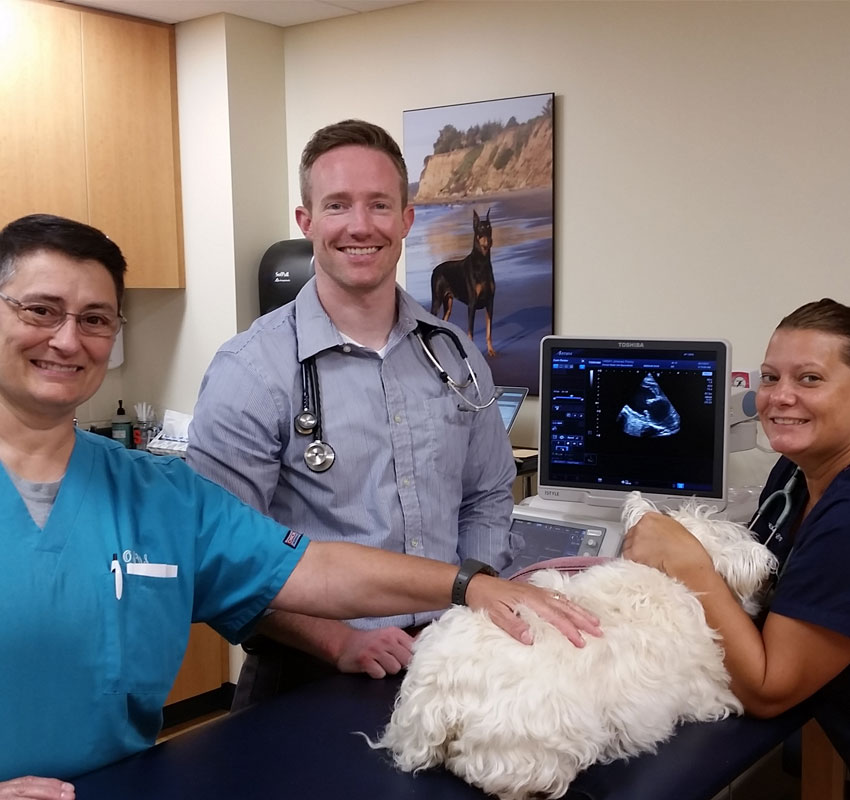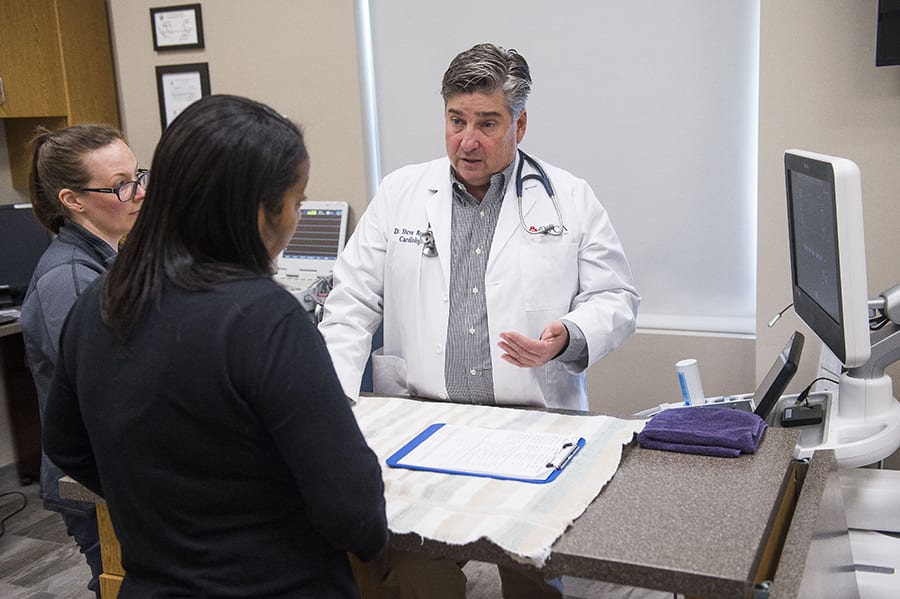Exploring the Vital Providers Used by a Vet Cardiologist: Comprehending Ultrasound and CT Check Methods
Vet cardiologists play a crucial duty in the health of animals by diagnosing and dealing with different heart conditions. They utilize innovative imaging methods, such as heart ultrasound and CT scans, to provide precise analyses. Each technique has its unique advantages and applications. Understanding these techniques is crucial for pet proprietors seeking the best take care of their buddies. What factors should family pet owners take into consideration when selecting between these analysis devices?

The Function of Veterinary Cardiologists in Pet Medical Care
Veterinary cardiologists play a vital function in the medical care of family pets, focusing particularly on diagnosing and dealing with heart-related problems. They possess specialized training that permits them to interpret complicated analysis tests and determine different cardiovascular issues. These experts utilize advanced techniques, such as echocardiography and electrocardiography, to examine heart function and framework accurately.Veterinary cardiologists likewise develop customized treatment strategies that may include drugs, way of living alterations, and, sometimes, medical interventions. Their competence includes educating pet dog owners about heart wellness, stressing the value of regular check-ups and very early discovery of potential troubles. Cooperation with general vets is important, as it guarantees detailed take care of animals with presumed cardiac issues. By providing specialized services, vet cardiologists greatly boost the lifestyle for pets and supply tranquility of mind for their owners, reinforcing the importance of heart health and wellness in total pet dog wellness.
Typical Cardiac Issues in Animals
Usual cardiac concerns in animals can significantly influence their health and lifestyle. Heart whisperings, numerous kinds of cardiomyopathy, and genetic heart defects are among the most common problems that vets come across. CT Scans For Dogs. Recognizing these issues is essential for pet dog proprietors to ensure timely medical diagnosis and suitable treatment
Heart Murmurs in Pets
Heart whisperings can be a source of problem for pet proprietors, they are not always a sign of serious health issues. A heart murmur is an unusual audio produced by rough blood flow within the heart. In animals, these whisperings can be created by different aspects, including genetic heart defects, shutoff problems, or perhaps stress during examinations. Several animals with heart murmurs lead typical lives without significant health and wellness effects. To identify the underlying cause, veterinary cardiologists often utilize diagnostic techniques such as echocardiograms and Doppler ultrasounds. Early discovery and evaluation are crucial, as they may aid manage any type of possible cardiac problems properly. Animal proprietors are urged to consult their veterinarian for an extensive analysis if a heart murmur is detected.
Cardiomyopathy Types Explained
Cardiomyopathy incorporates a group of illness influencing the heart muscle, bring about jeopardized heart feature in family pets. One of the most usual types consist of dilated cardiomyopathy (DCM), hypertrophic cardiomyopathy (HCM), and limiting cardiomyopathy (RCM) DCM primarily influences canines, causing the heart to weaken and increase the size of, which lessens its capability to pump blood effectively. In contrast, HCM is a lot more common in felines, defined by the enlarging of the heart wall surfaces, usually resulting in blocked blood circulation. RCM, though less common, happens when the heart muscle mass ends up being inflexible, restricting its ability to full of blood. Each type offers one-of-a-kind obstacles in diagnosis and therapy, necessitating specialized vet cardiological assessment to guarantee peak administration and care for influenced animals.
Hereditary Heart Defects
Hereditary heart flaws stand for a considerable category of cardiac problems in animals, distinct from obtained conditions such as cardiomyopathy - Ultrasound For Dogs. These flaws are structural problems existing at birth, affecting the heart's typical function. Typical kinds consist of license ductus arteriosus, ventricular septal issues, and pulmonic stenosis. Signs and symptoms may vary widely, ranging from light to severe, and can consist of exercise intolerance, coughing, and trouble breathing. Early medical diagnosis through sophisticated imaging strategies like ultrasound is crucial for effective administration. Vet cardiologists play an important function in identifying these problems and suggesting suitable therapy alternatives, which might consist of medical management or surgical intervention. Recognizing congenital heart flaws enables much better outcomes and improved lifestyle for affected pet dogs
Recognizing Heart Ultrasound: Just How It Works
A considerable number of veterinary techniques currently use heart ultrasound as an important analysis device for assessing heart wellness in animals. This non-invasive technique utilizes high-frequency acoustic waves to develop photos of the heart's structure and function. Throughout the treatment, a veterinary professional applies a gel to the pet's chest and makes use of a transducer to release ultrasound waves. These waves jump off the heart and bordering structures, producing real-time pictures on a monitor.Veterinarians can evaluate different facets of heart health and wellness, consisting of chamber dimension, wall surface activity, and shutoff feature. Additionally, cardiac ultrasound enables for the detection of problems such as fluid build-up and hereditary heart flaws. This method is important for diagnosing conditions that might not be noticeable via common radiographs. By supplying thorough info about the heart's makeup and performance, cardiac ultrasound aids in creating reliable therapy plans for pets dealing with heart problem.
The Significance of CT Checks in Identifying Heart Issues
Just how do CT scans improve the medical diagnosis of heart conditions in veterinary medication? CT scans give thorough cross-sectional photos of the heart and bordering structures, allowing veterinarians to visualize intricate physiological connections. This imaging strategy is particularly advantageous in recognizing congenital heart defects, heart lumps, and irregularities in capillary. By using advanced imaging formulas, CT scans can assess heart chamber sizes and feature, providing a complete sight that may be difficult to attain with standard methods.Additionally, CT angiography can envision blood circulation and identify locations of constriction or obstruction, which is important for intending prospective treatments. The rate and accuracy of CT scans additionally help with quick diagnoses, important in emergency situations. Ultimately, the incorporation of CT scans into vet cardiology considerably improves the accuracy of diagnoses, allowing targeted therapy plans and boosting client end results for pets dealing with heart problems.
Contrasting Ultrasound and CT Scan Techniques
While both ultrasound and CT scans are indispensable devices in vet cardiology, they supply distinctive benefits and constraints that influence their usage in diagnosing heart conditions. Ultrasound, or echocardiography, provides real-time imaging of the heart's framework and feature, enabling vets to examine heart chambers, valves, and blood flow. It is particularly reliable for assessing conditions like heart disease and cardiomyopathy. Nonetheless, ultrasound may be limited in envisioning certain anatomical frameworks due to individual size or obesity.In contrast, CT checks deal in-depth cross-sectional pictures of the heart and surrounding cells, making them ideal for recognizing structural problems, tumors, or vascular issues. Although CT scans provide extensive understandings, look at this site they require sedation and might include radiation exposure. Inevitably, the option between ultrasound and CT checks depends upon the details medical situation, the person's problem, and the information needed for an accurate diagnosis.
Treatment Choices Offered With Veterinary Cardiology
Veterinary cardiology uses a variety of therapy options customized to resolve various heart disease in pets. Treatment strategies usually begin with way of life modifications, including diet changes and workout adjustments, aimed at enhancing total heart health. Medicines play an essential function, with cardiologists recommending medications such as diuretics, beta-blockers, and ACE inhibitors explanation to enhance and take care of signs and symptoms cardiac function.In a lot more severe instances, interventional treatments, such as balloon valvuloplasty or stent positioning, may be essential to relieve obstructions or boost blood circulation. For sure genetic heart issues, surgical choices might be checked out to fix structural concerns. Additionally, ongoing surveillance and follow-up care are necessary components of a thorough therapy strategy, allowing for timely adjustments based upon the family pet's feedback to treatment. In general, veterinary cardiology concentrates on offering efficient, individualized like maximize the health and wellness and well-being of pet clients with heart conditions.
How to Prepare Your Pet for a Cardiac Analysis
Preparing an animal for a cardiac evaluation is necessary to assure accurate results and a smooth process. Proprietors need to first arrange the consultation with the vet cardiologist and go over any kind of particular needs or concerns. It is suggested to keep food for at the very least 12 hours before the analysis, as this aids enhance imaging top quality during treatments like ultrasound or CT scans.Additionally, maintaining a tranquil setting on the day of the appointment can help in reducing the pet's stress and anxiety. It is useful to bring along any type of appropriate clinical records, including previous tests and medicines (CT Scans For Dogs). Owners ought to likewise make certain that their animal is comfy and leashed during transportation to the center. Acquainting themselves with the analysis process can aid and relieve worries in asking educated inquiries during the appointment. By following these actions, owners can contribute substantially to the performance of the cardiac examination
Often Asked Questions
How much time Does a Cardiac Ultrasound or CT Scan Take?
The period of a cardiac ultrasound usually ranges from 30 to 60 mins, while a CT scan might take around 15 to half an hour. Aspects such as the client's problem can influence these time quotes.

Are There Any Type Of Risks Connected With These Analysis Treatments?

Can I Remain With My Animal During the Treatment?
The veterinary center's policy usually dictates whether animal owners can continue to be throughout treatments. While some facilities encourage owner existence for convenience, others might need separation to ensure security and excellent conditions for diagnostic imaging.
Just how much Do These Diagnostic Tests Typically Price?
The expenses of diagnostic examinations, such as ultrasound and CT scans, normally vary based on location and facility. Commonly, costs vary from a few hundred to over a thousand dollars, showing the intricacy and technology entailed.
What Is the Healing Refine After a Heart Evaluation?
The recovery procedure after a heart evaluation entails keeping track of the pet for any type of instant reactions, ensuring convenience, and limiting physical task. Vets usually give post-evaluation guidelines to direct animal proprietors during this important healing period. Heart murmurs, numerous kinds of cardiomyopathy, and hereditary heart issues are amongst the most prevalent problems that veterinarians come across. A heart whispering is an irregular sound produced by stormy blood flow within the heart. Cardiomyopathy go to these guys includes a group of diseases impacting the heart muscular tissue, leading to jeopardized heart function in pets. Congenital heart flaws stand for a considerable category of cardiac concerns in animals, distinct from obtained conditions such as cardiomyopathy. Ultrasound, or echocardiography, gives real-time imaging of the heart's framework and function, allowing vets to analyze heart chambers, valves, and blood flow.